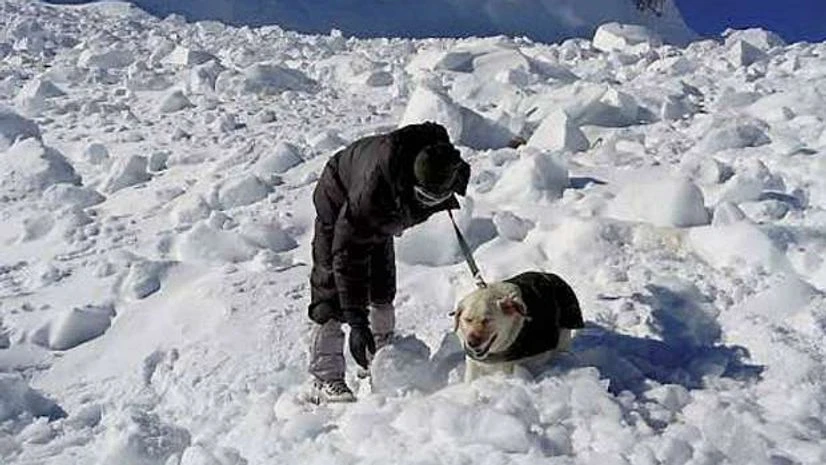Major Rajesh Bhardwaj (retd) of the Armed Medical Corps was part of Operation Meghdoot in 1984, when India gained control of the Siachen Glacier. This is his account of what living on the glacier was like.
“The occupation of the glacier began in 1984 with a very hush operation. The troops occupied all the heights on the glacier so as to get the strategic advantage – so important in mountains. At that time living conditions were very basic. We used to live in regular tents and had the regular high-altitude clothing and equipment – not the (high quality) kind supplied now.
Because there were no glasses to drink from, our Ladakh Scouts troops used to make glasses by cutting bottoms of bottles. To make curd, we used Vitamin C tablets as a souring agent.
Also Read
Letters from home would reach about three weeks after they were dispatched. We had no real-time connection with the outside world. On a lucky day we could pick up a newspaper from a helicopter pilot. Otherwise our news of the outside world was weeks old.
A chopper had crashed at an ‘assault camp’ and it made a nice glass house. I used to get in and sit in it for hours on end with my copy of Robert Frost’s poems.
The challenges then and now have always been related to two main things: the terrain and the climate. By terrain I mean extreme high altitude where it is impossible for humans to acclimatise, the crevasses, avalanches, blizzards and problems related to the extreme cold.
Things are better now because of better facilities and equipment, but it still does not take away the hostility of the glacier.
There were no toilets. We used to go out in the open. Sometimes going out was a problem because of the crevasses that open out in the summer months. We used to ‘rope up’ before going for our daily ablutions – two officers together – not only because of the crevasse but because sometimes the weather could turn nasty in minutes causing a whiteout and obscuring visibility.
To take a bath the troops had to melt snow. That was a very difficult task because it takes an enormous amount of snow to make half a bucket of water. I took a bath once in six weeks!
We were so starved of fresh food that once, after a gap of more than a month, some fresh food was dropped. I ate a bhindi (okra) raw just to get a feel of fresh food.
It is a male bonding exercise out there. You stay with your buddies. Once we had two young officers who were part of a high risk mission. They had formed a dancing troupe of two and their routine was to dance to the steps of female dancers from old Hindi movies – you know, with those elaborate hand and neck movements.
I was in charge of many camps that came under my medical care, so I would talk for hours with other camp commanders. Playing cards helped. There were only two officers at the camp where I stayed – Camp V. We would call one more officer from some other camp and play ‘three-man bridge’ for hours together. I also carried some books with me. That helped cope with the boredom and loneliness.
Believe it or not, I also learnt how to ski there by picking up skis used by our ski troopers and taking a few basic lessons.
But the single biggest stress buster was a letter from home – just like in the movies, Haqeeqat or Border.
The army tries its best to keep the morale of the soldiers at Siachen up. We were sent packets made by AWWA (Army Wives Welfare Association) volunteers –officers’ wives in Delhi – with chocolates, cards and letters of encouragement. Everyone would laugh on receiving these letters but secretly each soldier liked it and cherished the letter.
The unforgiving conditions on the glacier also lead to medical problems in soldiers: hypoxia, including acute mountain sickness, high altitude pulmonary oedema, constant breathlessness, headache, loss of orientation, frostbite of the extremities and hypothermia. There are other effects too like nose bleeds because of nasal drying and crusting, stomach ulcers, skin problems, respiratory problems, loss of memory, depression and a sense of isolation.
Because of the extreme hypoxia and low partial pressures of oxygen, any pre-existing medical condition is likely to be aggravated.
If a soldier started to behave abnormally after some time at the glacier, it was said, ‘Usko high alti ho gaya hai! (he is having high altitude related problems)’.
Prolonged exposures at these altitudes can cause long-term ill effects on the lungs, the heart and the brain, apart from the strain put on all aspects of locomotion, including the knees.
I think this is an impossible war in an inhospitable place and it is inhuman to expect our soldiers to fight from there. We should demilitarise the zone as soon as possible – the human cost is very, very high.”

)
